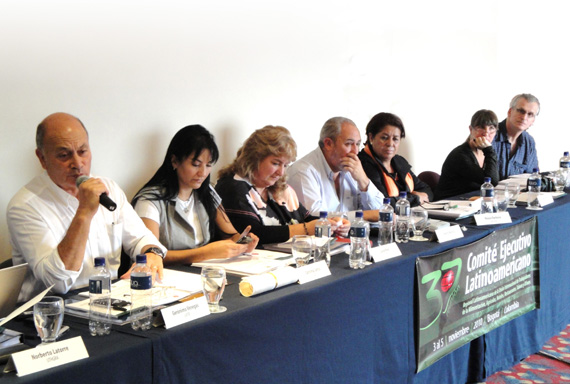|
Gerónimo
Venegas, general secretary of the Argentinean Union of Rural Workers and
Stevedores (UATRE), took office this month in the important position of
president of the IUF's Professional Group of Agricultural Workers.
Sirel
interviewed him to inquire about work plans.
-When did you
find out that you would be appointed to this important position in the IUF?
-It was during
the meeting of the IUF’s Administrative Committee in Stockholm, Sweden,
in late October. IUF General Secretary Ron Oswald was the one who
informed me of the decision.
-Are you
prepared to take on this new task?
-I’m a union
leader and I work very long hours in Argentina.
When I started out in UATRE’s
governing committee the organization had a membership of 15,000 workers. That
number has now swelled to 800,000.
We’ve grown in
every sense. Now I’d like to bring to this new international task the dreams I
once had for my own union, and make them come true for agricultural workers
around the world.
|
I’d like to bring to this new international task the dreams I once
had for my own union, to make them come true for agricultural
workers around the world. |
-What will you
be focusing on in your work?
-One of the
problems we have to address is that of the weaknesses that affect trade union
leaders. We have to conduct strong capacity-building initiatives for these
leaders and expand global membership.
I’m going to
present these issues at the next meeting of the International Agricultural
Executive Committee, because strengthening trade union leaders is a key element
in solving the problems that affect workers.
Many of them
have great initiative, they’re eager to do something, but we have to build their
capacity to defend workers’ rights. And that’s also the best way to reproduce
leaders for the future.
-What other
issues do you plan to address?
-In
Argentina we created a National Registry of Rural Workers and Employers,
which has been a very important instrument that could be replicated in other
countries.
In this sense,
the IUF has to make the most of its capacity to work with governments.
Here in
Colombia, for example, the national vice president, Angelino Garzón,
asked the IUF to join him in the Decent Work promotion projects that are
being implemented in agriculture, and I think that we have to make the most of
this opportunity.
What are the
most sensitive issues affecting the agricultural sector?
-The most
sensitive issue is the situation workers are in. They are very vulnerable, and
they are the poorest sector of the land.
Most
agricultural workers are not unionized, and they lack decent working conditions
and decent salaries. There are many cases of near-slavery conditions.
|
Most agricultural workers are not unionized, and they lack decent
working conditions and decent salaries. There are many cases of
near-slavery conditions. |
We have to
change this, because in a world where everything has grown and where technology
prevails, agricultural workers cannot continue to be the very last priority.
-What is your
opinion on the issue of Food Security and Sovereignty?
-It’s
governments who are responsible for implementing state policies to promote
permanent development in all things related with Food Security and
Sovereignty. Every nation has to be able to feed its people, it can’t depend
on others, and it also has to protect its natural resources, including its soil
and water, because we have to feed the people of today, but also the people of
tomorrow.
-How do you
assess the work at the 37th Meeting of the IUF’s Latin American
Executive Committee?
-It has been a
remarkable meeting. We achieved an enormous amount of work, and I want to
highlight the efforts, commitment, degree of organization, and the discipline of
the Committee members, and in particular of the regional secretary, Gerardo
Iglesias, and the president, Argentino Geneiro.
-What do you
think are the main challenges faced by the IUF?
-The IUF
faces a great deal of challenges, but one of the most important is its political
insertion. There’s no labor solution or social solution without a political
solution. Politics can be used to build or destroy. And we need to build.
 |